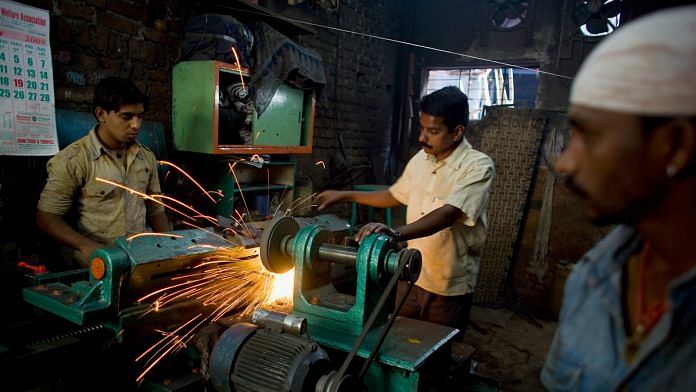India must take steps during the coronavirus lockdown to protect its Micro, Small and Medium Enterprises or MSMEs and guarantee a revival plan.
There are almost 67 million MSMEs operating in the non-agricultural sector in India, both unorganised and organised. Nowhere in the world is there such a large number of enterprises. Of these, 96.7 per cent are micro or unorganised — employing less than 10 workers. It is not sufficiently understood by policy-makers, or most academics, that only 3.3 per cent of all non-agricultural enterprises in India employ more than 10 workers, but much of the pink press is full of stories just about this minuscule segment.
The Foundation of MSME Clusters and its board (of which I am a member), after multiple consultations with MSME leaders, have proposed these measures to the Narendra Modi government to help the sector during the lockdown.
Also read: How can Modi govt revive economic activity when CMs want migrant workers to return home?
Protect MSME workers
Workers are key. Post-lockdown, there is already an anticipation of the shortage of labour that enterprises are likely to face, whether small or large.
The report by the Working Group on Migration (GoI, 2017) identified 54 districts that account for half the male interstate out-migration in India. Of these, 36 districts are concentrated in eastern Uttar Pradesh and Bihar, with certain districts in other states like Nadia and Midnapore (West Bengal), Ganjam (Odisha), Gulbarga (Karnataka), Jalgaon (Maharashtra) and Pali (Rajasthan) and a few in western UP. Armed with this information, special transport arrangements should be drawn up to match the demand and supply of labour across India.
In the relief package, of Rs 1.7 lakh crore, the Modi government is willing to pay provident fund contribution for employees to EPFO for those earning up to Rs 15,000 per month. However, MSMEs say that most workers earn more than Rs 15,000 and they will not be covered by this plan. This limit can be raised to Rs 30,000 with a cap on number of persons employed. This money could alternatively be given as wage subsidy to MSMEs based on their GST returns.
Employers pay continuously to the Employees State Insurance Corporation (ESIC), as medical insurance cover, and Rs 1 lakh crore is locked there unused. The fund should be partially channeled for providing training in occupation health and safety for MSMEs, especially during the Covid-19 crisis.
Labourers who have gone home should be assured Ayushman Bharat hospital insurance cards to restore confidence that if they fall ill, their hospitalisation costs will be met (unless the ESIC hospitals cover them). They would be more confident about returning to work. Adequate transportation arrangements must be made for migrant workers to return.
Approved/certified medical agencies should be brought on board to provide health and safety training at factory sites in clusters.
Also read: Modi govt plans stimulus for MSMEs and unorganised sector, but no ‘big bang’ package likely
Give financial incentives
Liquidity is the key to the revival of MSMEs. The micro and household enterprises will suffer the most and therefore public support must be extended to microfinance institutions (MFIs) and Non-Banking Financial Companies (NBFCs) that provide loans to MSMEs. They, in turn, must pass on the benefit to their borrowers. The credit guarantee trust may need buttressing so they can further guarantee lend to MSMEs.
Three months moratorium is not enough for many MSMEs with longer working capital cycles and slow recovery of markets. The moratorium should be extended to six months.
This proposed moratorium does not include waiver of interest rate. It is understood that compound interest will be charged later. Interest during the moratorium period should either be waived off completely or at least partially. This will mean a subsidy of Rs 45,000 crore approximately with partial waiver of 50 per cent.
Working capital loans should be provided to an estimated 20 lakh artisanal units with an estimated average turnover of Rs 10,000 a month, assuming the labour and raw material component to be half and half. Taking a working capital cycle of three months, the loan requirement can be estimated at Rs 3,000 crore for material inputs and Rs 6,000 crore if we include labour cost as well. A loan fund of Rs 6,000 crore should be created for provision to the artisans at zero per cent rate of interest for a year, amounting to an interest rate subsidy of Rs 720 crore.
While NBFCs and MFIs are giving moratorium to micro-enterprises, they are not getting that benefit from the banks. This support should be given.
The current account limits on working capital of the MSMEs should be increased by at least 75 per cent. The government should stand guarantee for the same.
Payments stuck with large public and private sector units must be released as soon as possible. The Modi government has already given such instruction and it should follow up rigorously. GST input tax credits and income tax refunds should be expedited.
At a time when the industry is not using electricity, minimum charges on electricity (as per contract demand) should be waived off.
Also read: Social security net could be Modi govt’s route to protect unorganised workers
Grant waivers for raw material
Imported raw materials (sports goods, silk, rubber) or raw materials that are sourced from distant places (rubber) are not coming in due to the lockdown. Transport of these select imported materials can be allowed if it is stuck at ports or airports.
Raw materials at ports and container depots are stuck and cannot be shipped; however, MSMEs have to pay rent for it. This must be waived off.
Promote MSMEs online
Promote e-marketplace for artisans whose marketing channels will get severely restricted as melas and trade fairs will not take place for quite some time now.
The author is a Professor of Economics at Centre for Labour, Jawaharlal Nehru University. Views are personal.



